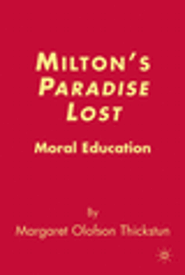
Margaret Thickstun, the Elizabeth J. McCormack Professor of English Literature at Hamilton, has published a new book, Milton's Paradise Lost: Moral Education (Palgrave Macmillan, April 17, 2007).
According to the publisher, this book "reads Milton's Paradise Lost as a poem that seeks to educate its readers by narrating the education of its main characters. Many of Milton's characters enter the action in late adolescence, newly independent and eager to test themselves, to discover who they are and their place in the world. The poem charts their progress into moral adulthood. Taking as its premise that attention to the moral development of the poem's main characters will open the poem to most undergraduate readers, this book explores both the pedagogical activity within Paradise Lost and the pedagogical activity that the poem encourages. Both experienced teachers and newly minted ones should find the discussions of the poem itself and the project of teaching it helpful."
Reviewer Louis Schwartz, of the University of Richmond says "By a series of careful reexaminations of the most important 'scenes of instruction' in Milton's text, Thickstun consistently illuminates the significance of details many critics have ignored or misunderstood. The prose is also engaging, often funny, and enviably clear. This is a bracing, entertaining, and generous book."
In another review, Diane Kelsey McColley, Rutgers, The State University of New Jersey, Camden College of Arts and Sciences, notes, "Thickstun provides an admirable and salutary reading of Milton's epic as a 'fabric of loving relationships' in which God as Father nurtures the moral growth of his angelic and human offspring, not by a set of rules but by giving Raphael, Abdiel, Uriel, Satan, Adam, Eve, and others moral responsibilities as teachers and learners."
James W. Fowler, Emory University professor says, "Thickstun's unprecedented reading of John Milton's Paradise Lost, in dialogue with contemporary research and theory on moral and faith development, provides a compelling demonstration of how great literature can stimulate both cognitive and emotional growth for high school and college students."
Thickstun received her Ph.D. from Cornell University and joined the Hamilton faculty in 1988. She specializes in the English Renaissance, and her teaching interests include seventeenth-century English and American literature, including Milton and other Puritans and women writers, the relationship between literacy-both literal and cultural-and authority. She is the author of Fictions of the Feminine: Puritan Doctrine and the Representation of Women as well as articles on Milton, Bunyan, Swift, and seventeenth-century women's religious arguments. Her articles have been published in journals such as Studies in English Literature and Milton Quarterly.
Posted April 18, 2007
